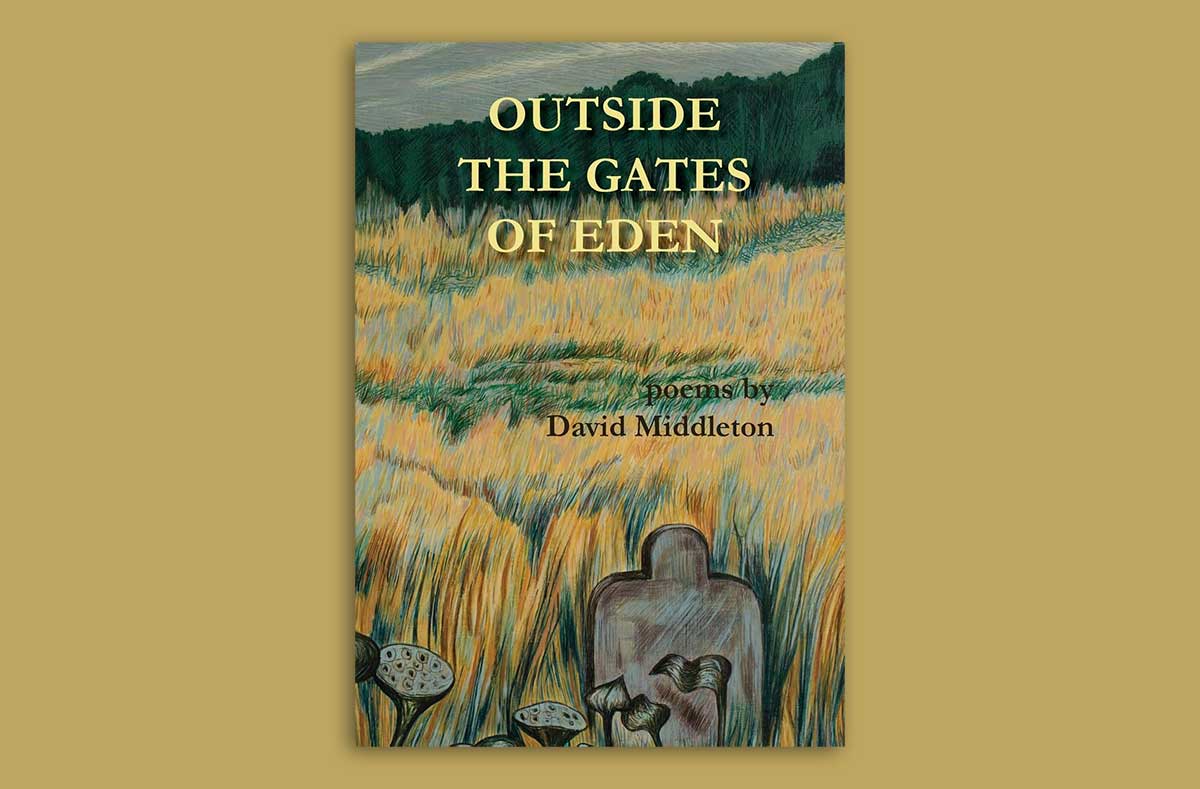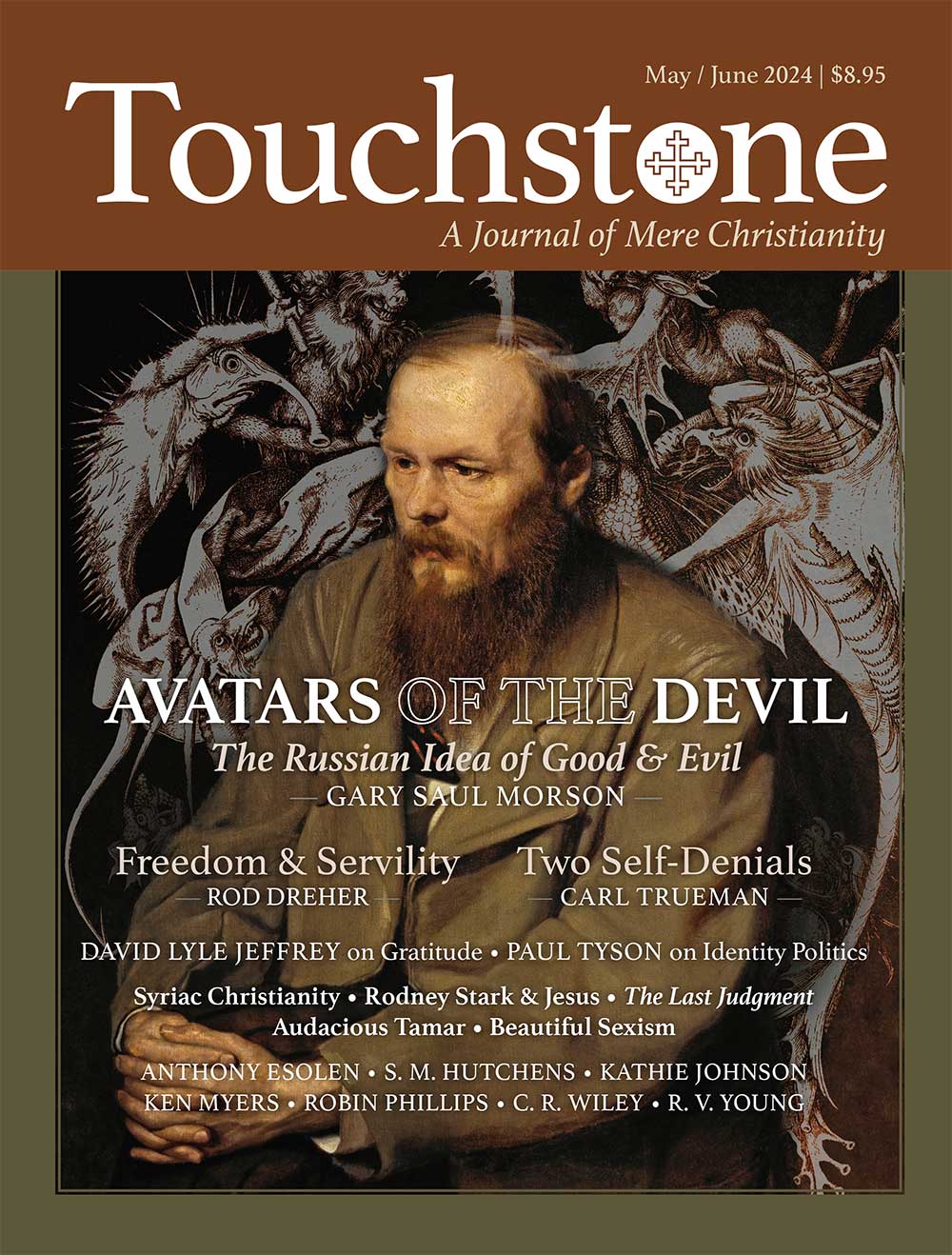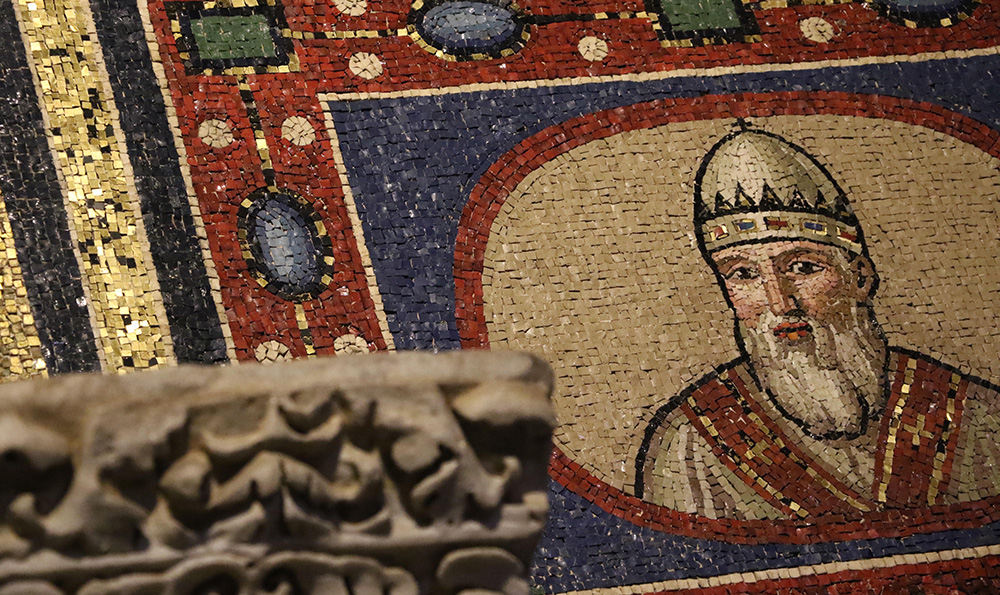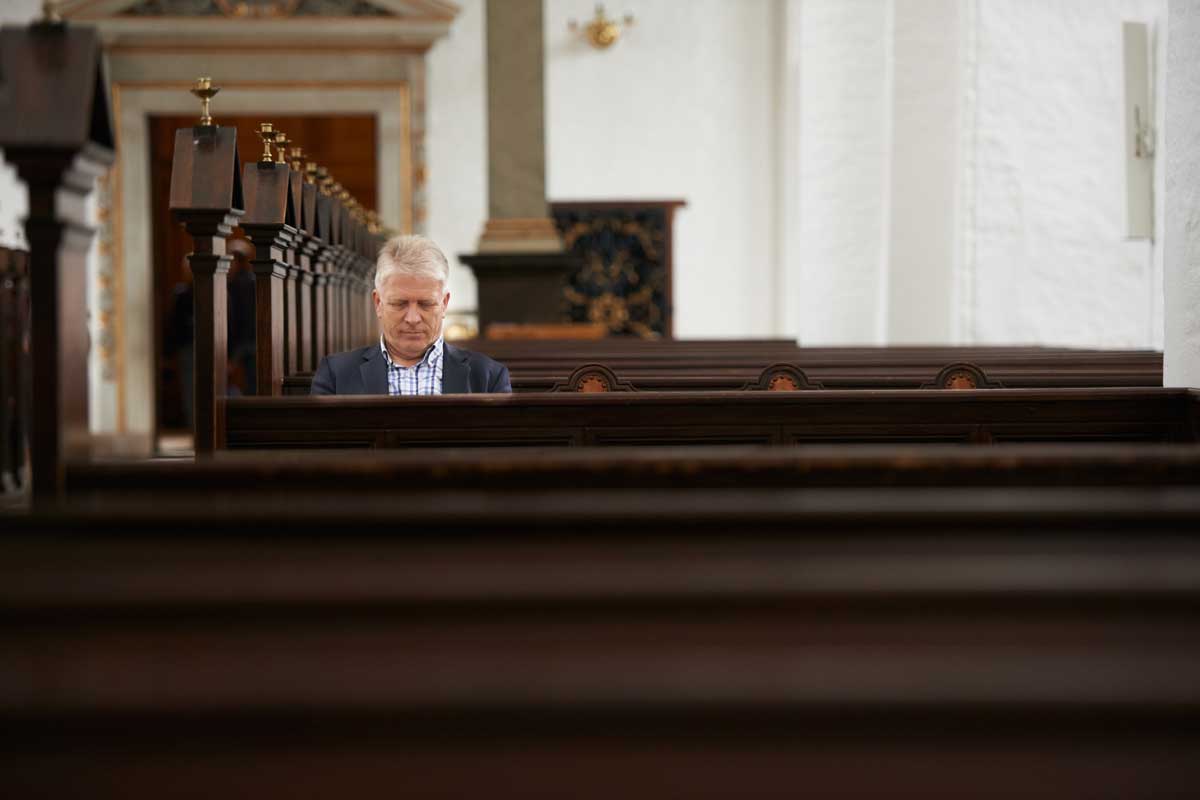A Christian Vision of the Secular World
Outside the Gates of Eden: Poems by David Middleton
When we mention Christian or religious poetry, we typically have in mind lyrical verse that deals with specifically biblical themes or expresses the experience of sin, forgiveness, grace, or repentance. The poems in George Herbert’s The Temple provide a good example, Gerard Manley Hopkins’s “Terrible Sonnets” another. The focus is on a man’s immediate and explicit encounter with God. Such poetry can be enlightening, edifying, even consoling. Nevertheless, it is important that we recognize the pervasive presence of God in our world and in our lives when we are not in the posture of worship or even consciously thinking about him. Poetry ought to help us do this, and David Middleton’s new volume is a striking example of how it can be done.
The title, Outside the Gates of Eden, contains an unmistakable biblical reference, but most of the poems in the book would not strike most readers as “religious” or “Christian” in any obvious way. The more attentive and reflective the reader, however, the more decisively a pattern of Christian awareness will emerge. Middleton is a particularly acute Christian observer whose poetic vision is informed by his Christian faith even when he is not addressing a topic from a Christian angle or with a definite Christian precept in mind. God created the world—the reality that we inhabit—through his Word, and it was with the Incarnation of his Word that he redeemed it. A poet who is faithful to his vision of experience will offer a true representation of the creation to the extent that his perceptions are accurate and profound. For this reason, it is worth every Christian’s time and effort to acquaint himself with poetry in order to share the vision of a powerful imagination. If that imagination is informed by grace—so much the better.
David Middleton provides a novice with an excellent means of learning to read contemporary poetry. The meaning of his verse is not obscured by tortuous syntax, esoteric diction, or erudite allusion. He does not dazzle his reader with figurative pyrotechnics or lavishly contrived labyrinths of imagery. As a result, his work may appear deceptively simple, but this is its advantage for a reader who will be discouraged if even determining the literal, surface meaning of a poem is a challenge. Most readers will know what most of the poems “mean,” in the obvious sense, the first time through. But read again, and yet again, and the rhythm and the verbal music of the verse will reveal more and more the beauty and subtlety of his carefully modulated language.
A Symbol for Fallen Man
Outside the Gates of Eden begins with “Night Watchman at the Zoo,” which would seem to be an altogether “unpoetical” subject; but Middleton infuses the poem with a quietly humorous irony, which, on further reflection, manifests a strand of poignant nostalgia. It slowly becomes apparent that the zoo is modern man’s sad attempt to reconstruct the experience of the paradisiacal garden forfeited for us by Adam and Eve. Equipped with “flashlight, cell phone, pistol,” the night watchman is the less-than-angelic guardian of this manmade Eden from the depredations of thoroughly practical thieves:
I watch for quiet intruders who provide
Stolen calves and cubs to the roadside zoos
Where they will languish, maddened in their cells,
Or offer them as curios to those
So rich and bored they need menageries,
Pure spectacle, a conversation piece.
For the dedicated watchman, his public zoo (the poem’s subtitle is “Audubon Zoo, New Orleans, Louisiana”) is a good-faith attempt to restore, in some measure, the Edenic relationship between man and beast, not the pure exploitation of carnival and collector. The toys children take home from the gift shop—“Stuffed lions smiling wide, soft cuddly bears, / Limber, rubber snakes showing rubber fangs, / A windup ape beating its plastic chest”—mark the innocence of the enterprise.
Still, the best intentions of men can provide only an unnatural life in “artificial habitats”:
Savannahs, caves, pools, jungles, waterfalls—
A wilderness constrained by moat and bar,
A red wolf kept from swamp hares by the wire,
A cheetah’s caged eyes fixed on still gazelles.
The vigilant watchman sees himself as “the heir / Of Adam who tamed animals with names,” but most of the beasts “live in a state beyond recall,” “Their habitats shrunken to this small space, / Too captive-bred ever to hunt again.” The somewhat pretentious speaker of this poem is mildly comic, but he is not merely risible and certainly not contemptible. His aspirations are noble, but they exceed the possibilities of his job. In this, he is an apt symbol for fallen man: created in the image and likeness of God, his nature and his aspirations are noble, but marred by sin; his efforts to recover Eden, unless transfigured by grace, result at best in a well-run zoo. The unstated but unmistakable text lying behind this poem is Romans 8: “For the creation waits with eager longing for the revealing of the sons of God.”
Of course, I have merely touched the surface of this poem’s rich significance, and while I can by no means deal with it all here, its specifically poetic means of evoking meaning merit consideration. First, note that, although “Night Watchman” has few end rhymes and no set rhyme scheme, it is a metrical poem, not free verse. Blank verse, the verse of Shakespearean drama, is unrhymed iambic pentameter; that is, each line consists of five metrical “feet,” and each “foot” contains an unaccented followed by an accented syllable. This formal rhythmic pattern generates tension with the random rhythm of ordinary speech—hence an effect of verbal syncopation. Each word must be chosen with care and placed in relation to the other words in the discourse in a way that highlights both rhythm and meaning. Slavish adherence to the meter creates a sing-song effect, the mark of an unskilled poet, analogous to a student pianist playing strictly according to the metronome.
An example of meaningful metrical variation in Middleton’s poem comes in the watchman’s indignant reflection on “Chinese safari parks where those who come / Pay to toss goats alive to waiting lions. . . .” The first foot of the second line is inverted, so that “Pay” receives extra emphasis. The unanticipated and harsh accent on “Pay” underscores how men, who ought to be stewards of creation, have commodified beasts merely to gratify vicious desires. Thus, discourse measured into verse provides opportunities to expand and enhance meaning.
Images of Mortality & Entropy
Although Middleton is a plain-style poet, who sometimes eschews a set rhyme scheme, he is also a poetic virtuoso capable of executing exacting metrical forms. Among the most demanding is the villanelle, which, according to Babette Deutsch’s Poetry Handbook, comprises “nineteen lines on two rhymes in six stanzas, the first and third lines of the opening tercet recurring alternately at the end of the other tercets, and both repeated at the end of the closing quatrain.” Given the paucity of rhymes in English, it poses a real challenge for poets writing in our language; but the incessant, not to say obsessive, repetition can create a very powerful poem by incrementally drawing out a deeper and more extensive range of meanings from an image or idea.
“As Far As Light Remains” is a superb example of this form, placed toward the end of Outside the Gates of Eden. The first and third lines of the opening stanza offer two especially suggestive images:
All alone in twilight a cold crow is calling
Out of a leafless tree while near and far away
As far as light remains a ghostly snow is falling.
The next four tercets offer, in order, “dying thinkers,” “poets,” “theologians,” and “physicists” all brooding on the ominous intimations of the “cold crow” and the “ghostly snow,” portending not just individual death but the winding down of the physical universe itself. The closing quatrain furnishes the only human answer, equivocal though it may be, to the chilling images of mortality and entropy:
Yet when these others falter, silent lovers sprawling
In love’s sweet after-sadness say best in their own way
All alone in twilight a cold crow is calling
As far as light remains a ghostly snow is falling.
Middleton’s metrical tour de force provides a poignant evocation of fallen man’s despair and hope.
A Remedy for Disrupted Peace of Soul
I have discussed only two of the poems in this rich new volume, because I wished to offer enough detailed comment—insufficient although it is—at least to suggest how best to enjoy it. If you are already a reader of poetry, then you will find delights and consolations in David Middleton’s poems.
If you are not a reader of poetry, then you ought to be. In a world that thrusts upon us endless occasions for distraction, indignation, and dismay, all calculated to disrupt our peace of soul, there is no better remedy, apart from prayer and prayerful reading of Scripture, than to turn off your tablet, put your cell phone aside, and silence whatever noise is emanating from the radio or the television. Sit quietly for thirty minutes and read carefully a poem or two or three. David Middleton will give you a sense of seeing the world through the eyes of a fellow mere Christian, and you will find that he expands your understanding of the Bible and your prayer life.
R. V. Young is Professor of English Emeritus at North Carolina State University, a former editor of Modern Age: A Quarterly Review, and the author of Shakespeare and the Idea of Western Civilization (Catholic University of America Press, 2022). He and his wife are parishioners at St. Ignatius of Antioch Church in Tarpon Springs, Florida. They have five grown children, fifteen grandchildren, and three great-grandchildren. He is a senior editor of Touchstone.
subscription options
Order
Print/Online Subscription

Get six issues (one year) of Touchstone PLUS full online access including pdf downloads for only $39.95. That's only $3.34 per month!
Order
Online Only
Subscription

Get a one-year full-access subscription to the Touchstone online archives for only $19.95. That's only $1.66 per month!
bulk subscriptions
Order Touchstone subscriptions in bulk and save $10 per sub! Each subscription includes 6 issues of Touchstone plus full online access to touchstonemag.com—including archives, videos, and pdf downloads of recent issues for only $29.95 each! Great for churches or study groups.
Transactions will be processed on a secure server.
more on poetry from the online archives
more from the online archives
calling all readers
Please Donate
"There are magazines worth reading but few worth saving . . . Touchstone is just such a magazine."
—Alice von Hildebrand
"Here we do not concede one square millimeter of territory to falsehood, folly, contemporary sentimentality, or fashion. We speak the truth, and let God be our judge. . . . Touchstone is the one committedly Christian conservative journal."
—Anthony Esolen, Touchstone senior editor











